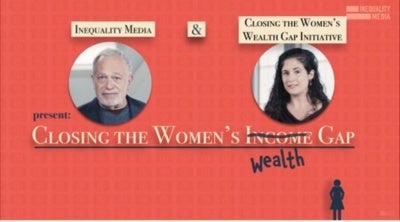Saturday was Women’s Equality Day, and women still earn far less than men. And perhaps even more distressing, women’s wealth is also far lower than that of men. The median wealth held by single women was just $3,210 compared to $10,150 for single men according to the 2013 Survey of Consumer Finances. Short-term earnings are hindered by greater earning volatility as women are more likely to shift between full- and part-time jobs or leave the workforce, to have fluctuations in the number of part-time hours they work, and work in sectors with less stable, lower-income jobs. Long-term earnings are hindered by unequal pay, less time spent in the workforce, and less access to work-sponsored retirement plans. As Ray Suarez pointed out at our event on Retirement Tax-time Incentives, “men earn more, women save more, but neither is enough to prepare for retirement.”
Women make a large economic impact. Women with paid jobs represent $21 billion in American GDP each day. And this number doesn’t include unpaid contributions by women including childcare, caregiving, and domestic work like cooking and cleaning.
We are committed to raising up solutions for this critical issue facing women and the country. As such, we are part of the Closing the Women’s Wealth Gap Initiative, a network of more than 150 individuals, representing 100 organizations, who are working together to advance policies and practical strategies that build wealth for low-income women and women of color. The below video, featuring Robert Reich, on closing the women’s wealth gap highlights many of the financial issues women face as well as solutions. We encourage you to watch it and share it with your networks.
We asked our fellow colleagues what the issue of women’s financial inequality means to them and why they do what they do. This is what they had to say.
Kiese Hansen, Program Associate
There are many layers to why I work for FSP and care about the financial security of families. Women’s Equality Day is a reminder of one of my main motivations. Just under 100 years ago, women were granted the right to vote under the 19th amendment. The amendment was not a fix all however. It took until the Voting Rights Act of 1965 for many minorities across the US to be allowed, and feel empowered, to vote.
Today, women, specifically black women, have made huge social gains despite historic setbacks. In recent years, black women have voted at a higher rate than any other demographic group. Furthermore, black women are now the most educated group in the US.
Given these impressive statistics, one would assume that economically, black women are thriving. Unfortunately, this is far from true. Black women in the US are paid 63 cents for every dollar paid to white, non-Hispanic men. This wage gap is largely due to the fact that black women are over represented in low wage jobs. However, according to the National Women’s Law Center, a wage gap exists at every education level.
The impacts of unequal pay manifest in different ways. In the short term, it can mean limited mobility and burdensome debt obligations. In the long run, it can stifle the ability to save and build a financial cushion. For mothers, between childcare, rent costs, and other basic expenses, it can mean stretched budgets and increased stress. In the long term, it can mean needing to work longer hours and delayed retirement.
I am devastated by this reality, but believe it can be corrected. With continued attention and an investment of appropriate resources, we can work to close this gap and improve the financial security of black women in the US.
Katie Bryan, Communications Manager
I was brought up in a household where consumers matter. My father spent over 30 years working to protect consumers with the Department of Consumer Affairs in Los Angeles. I share his passion to fight for consumers’ rights and to create an environment where consumers are empowered to seek assistance, make informed choices, and be protected from deceptive or unfair business practices.
So it was the perfect fit when I took a job for the America Saves program at the Consumer Federation of America (CFA). America Saves encourages Americans to save money and build wealth. It was here that I discovered just how many Americans are struggling financially. According to the Federal Reserve, Forty-four percent of adults say they could not cover an emergency expense costing $400.
I saw first-hand the savings gaps between men and women. Each year we surveyed the individuals who had pledged to save money through America Saves. As a group, female savers reported saving $2,000 less per household since joining America Saves than male savers—$1,000 versus $3,000. Females also reported trying to save $300 less each month than males—$200 versus $500. These weren’t just average men and women, they were men and women who were motivated to save and signed up to get help from us. And yet, even when women were motivated to save, we were seeing that they were not as successful as their male counterparts.


